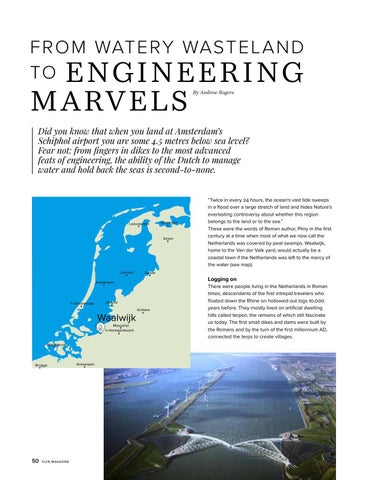F R O M WAT ERY WASTELAN D TO EN GI N E E RI N G
MA RV ELS
By Andrew Rogers
Did you know that when you land at Amsterdam’s Schiphol airport you are some 4.5 metres below sea level? Fear not: from fingers in dikes to the most advanced feats of engineering, the ability of the Dutch to manage water and hold back the seas is second-to-none.
Leeuwarden
Groningen
Assen
Lelystad
Zwolle
Amsterdam
’s-Gravenhage
Utrecht
Waalwijk Maasdriel ’s-Hertogenbosch
Middelburg
Brugge
50
FLCN MAGAZINE
Antwerpen
Arnhem
“Twice in every 24 hours, the ocean's vast tide sweeps in a flood over a large stretch of land and hides Nature's everlasting controversy about whether this region belongs to the land or to the sea.” These were the words of Roman author, Pliny in the first century at a time when most of what we now call the Netherlands was covered by peat swamps. Waalwijk, home to the Van der Valk yard, would actually be a coastal town if the Netherlands was left to the mercy of the water (see map).
Logging on
There were people living in the Netherlands in Roman times, descendants of the first intrepid travelers who floated down the Rhine on hollowed-out logs 10,000 years before. They mostly lived on artificial dwelling hills called terpen, the remains of which still fascinate us today. The first small dikes and dams were built by the Romans and by the turn of the first millennium AD, connected the terps to create villages.











